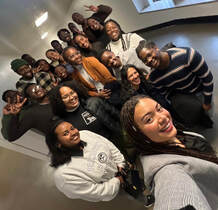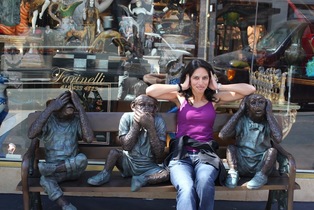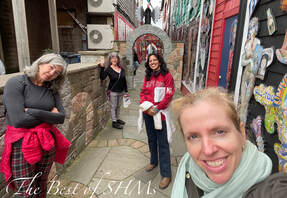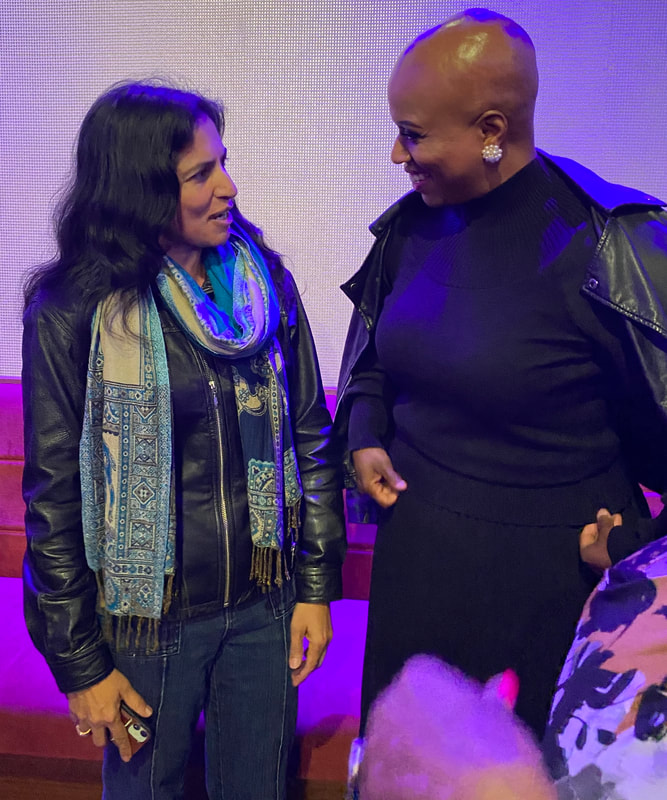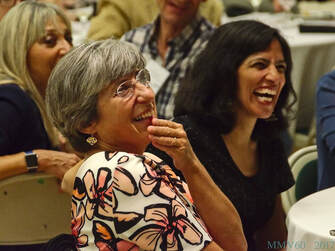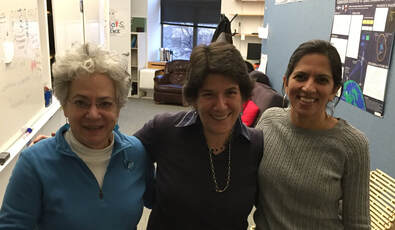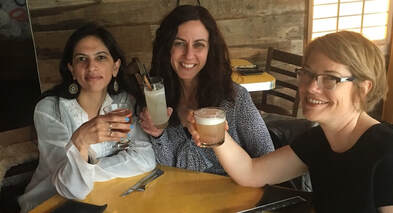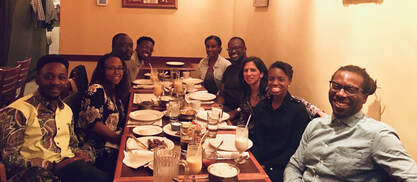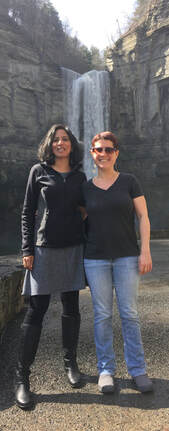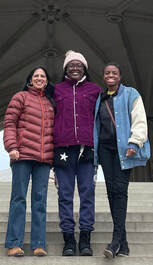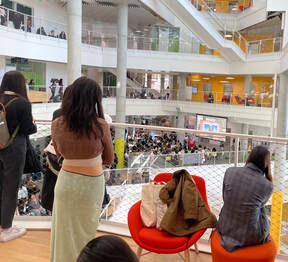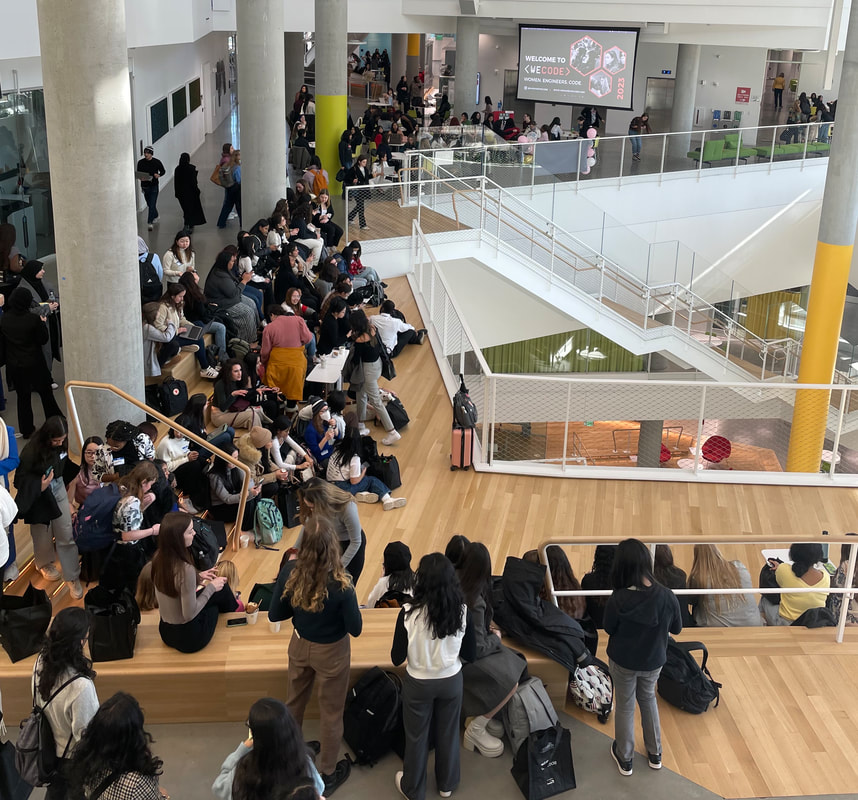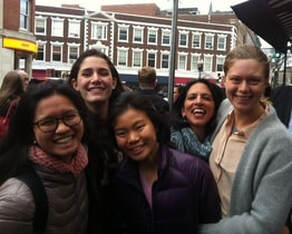Down with the Myth of the "Real" Scholar
Science is a wonderful privilege that I enjoy, and to me, scientific culture determines the quality of research, discovery and invention that we produce. Yet, as an academic culture we suffer from a persistent lack of diversity and many negative cultural trends, like valuing competitiveness and workaholism over collaboration and equity. Collective culture is a choice. While as an individual I feel very puny and ineffective at making any difference whatsoever, I believe that collectively we have the power to completely change culture. Change is hard work and best done together. I am proud to be part of a global network that cares about these issues --- it is where some of the best scientific ideas are coming from, because the best people know there is no science without humanity.
On this page you can see some resources and ideas around collective culture, as well as a list of the activities that I have been involved in. For more inspiration, see the webpages and work of my awesome colleagues, Margo Seltzer, Angela DePace, Olga Russokovsky, Rediet Abebe, and Uri Alon.
Science Culture Activism resources I recommend:
So you want to talk about Race, by Ijeoma Oluo (a must read book for all non-Black Academics and all Administrators)
Lean In, by Sheryl Sandberg (a must read book for all Male faculty and all Chairs/Deans)
The documentary 13th, by Ava DuVernay (required watching at my kid's high school, so why not you?)
An Open Letter to South Asians, on #BLM (a short must-read for all South Asian academics in the US)
Race after Technology (Benjamin), Design Justice (Constanza-Chock), Data Feminism (D'Ignazio and Klein) (SSR reading list)
Anything by Angela Davis, Audre Lord, Pauli Murray, and the many great intersectional activists who changed US history.
If you are at Princeton, check out our "Diversity Bookshelf" in the Robotics Fwing and attend our reading hour.
Science Culture Activism I Work On (a selected subset):
A disturbing narrative in academia is that it is not possible to achieve scientific success while pursuing any kind of activism, or that academic excellence can be achieved while ignoring equity. This narrative is maintained by the active erasure of those who challenge the system. I hope that this list provides you with inspiration, and provides me with less erasure.
Science is a wonderful privilege that I enjoy, and to me, scientific culture determines the quality of research, discovery and invention that we produce. Yet, as an academic culture we suffer from a persistent lack of diversity and many negative cultural trends, like valuing competitiveness and workaholism over collaboration and equity. Collective culture is a choice. While as an individual I feel very puny and ineffective at making any difference whatsoever, I believe that collectively we have the power to completely change culture. Change is hard work and best done together. I am proud to be part of a global network that cares about these issues --- it is where some of the best scientific ideas are coming from, because the best people know there is no science without humanity.
On this page you can see some resources and ideas around collective culture, as well as a list of the activities that I have been involved in. For more inspiration, see the webpages and work of my awesome colleagues, Margo Seltzer, Angela DePace, Olga Russokovsky, Rediet Abebe, and Uri Alon.
Science Culture Activism resources I recommend:
So you want to talk about Race, by Ijeoma Oluo (a must read book for all non-Black Academics and all Administrators)
Lean In, by Sheryl Sandberg (a must read book for all Male faculty and all Chairs/Deans)
The documentary 13th, by Ava DuVernay (required watching at my kid's high school, so why not you?)
An Open Letter to South Asians, on #BLM (a short must-read for all South Asian academics in the US)
Race after Technology (Benjamin), Design Justice (Constanza-Chock), Data Feminism (D'Ignazio and Klein) (SSR reading list)
Anything by Angela Davis, Audre Lord, Pauli Murray, and the many great intersectional activists who changed US history.
If you are at Princeton, check out our "Diversity Bookshelf" in the Robotics Fwing and attend our reading hour.
Science Culture Activism I Work On (a selected subset):
A disturbing narrative in academia is that it is not possible to achieve scientific success while pursuing any kind of activism, or that academic excellence can be achieved while ignoring equity. This narrative is maintained by the active erasure of those who challenge the system. I hope that this list provides you with inspiration, and provides me with less erasure.
- Science Culture: In 2013, I wrote a Guest Blog for Scientific American (The Awesomest 7 Year Postdoc) on challenging myths surrounding tenure-track life and on my personal efforts to be the best "whole person" I could be; this blog struck a chord with many people across many careers and is still widely read. In 2018, I developed, gave, and recorded a talk called The Pursuit of Collective Intelligence: 3 Myths to Replace (video) as part of an ongoing series of talks on identifying and replacing dangerous narratives in academic culture. This recorded talk was given in the Distinguished Lecture Series on Science and Engineering Culture at Cornell University created by my awesome colleague Prof. Hadas Kress-Gazit, and was also given at RSS Women in Robotics Workshop (2017), CRA-W Grad Cohort Keynote Talk (2019), MIT Design Justice Workshop (2022), and many other events. I am a regular speaker and panelist at many diversity-equity-inclusion (DEI) events each year (5+). You can often find me at the CRA-WP Grad Cohort, MIT Path2Professorship, NSBE annual convention, and other annual events that challenge academic inequity.
- SSR Lab Culture: In my lab, we combine "inreach" (self-education/reform) with "outreach" in intentional and experimental ways. For over a decade now, we have had "culture day" group meetings (~3/year) where we watch videos and discuss articles on social responsibility goals (e.g. work-life balance, anti-racism/sexism, AI/Robotics ethics, environmental concerns, ethics education etc). At Princeton, we have added a 1 Book/Semester reading for our group to create a shared understanding and language around social justice; our 2023-24 list is Race After Technology, So You Want to Talk about Race, Lean In, Design Justice. We are taking several steps to address systemic bias in our courses/citations: in 2023 we adopted Prof. Dani Bassett's Citation Diversity Statement to increase awareness about citation bias and help mitigate it, and I am redesigning my Princeton courses on swarms and robotics to actively address gender and racial bias. Our undergraduate research opportunities are intentionally designed to focus on impact, prioritizing those who have been excluded from opportunities, belonging, and mentorship. We now work closely with the Princeton NSBE board to understand how to best serve students from under-represented minority communities. My lab at Harvard was very active in K-12 and Public-facing STEM events, especially those that promote DEI in STEM. Our lab's startup ROOT Robotics was aimed at broadening and diversifying early education in programming and AI/Robotics (now part of iRobot). SSR Lab Culture is a collective result of many amazing alumni, who now implement and invent new ideas in their own labs and groups.
- Recent Activities at Princeton (2022-present):
- NSBE Princeton Chapter: I recently became the faculty advisor for the NSBE chapter at Princeton. One of our first and very successful initiatives in Spring 2023 was to take ~30 undergraduate students from SEAS to the NSBE Annual Conference, for the first time and fully funded by Princeton. This was a major undertaking, and I worked closely with Yenet Trafesse (NSBE Chapter President) who led the effort, with significant help from Princeton staff members Caasi Love, Emma Kruse, and Baffour Osei. I also work with the NSBE board on their initiatives for improving undergraduate research and mentoring, faculty-student mixers (joint with SHPE and SWE), and local STEM outreach.
- SEAS Robotics Diversity Bookshelf: SSR lab member Dr. Hungtang Ko created a DEI bookshelf in the Swing shared robotics space, where members of any robotics group can borrow books on race, gender, equity topics. In addition, he runs the Diversity Reading Hour every other Friday, where people informally get together to read and discuss. Dr. Ko also leads our lab's efforts on citation diversity and reducing systemic bias in our swarm intelligence courses.
- Pandemic Sabbatical (2020-2021): During my "pandemic sabbatical" I helped start several new initiatives:
- (1) Black-in-Robotics (BiR): BiR is a new non-profit addressing systemic BLM issues in our robotics community, through community building, advocacy, and accountability initiatives; it was c-founded by my robotics colleagues Prof. Ayanna Howard and Prof. Monroe Kennedy. I helped start the Black-in-Robotics Boston Chapter, alongside several amazing Boston area roboticist-activists Prof. Kris Dorsey, Dr. Seun Araromi, and Randi Williams. I also helped establish the Amazon Sponsorship of BiR, our first corporate sponsor, providing generous financial support for infrastructure/events.
- (2) Amazon Day 1 Scholarships: I co-led the development of a new DEI program at Amazon to create 6 fully-funded minority masters fellowships in robotics/data science at MIT, Stanford, and Harvard; this was joint work with my Amazon colleagues Tye Brady, Anna Davydova, Amanda Rodriguez Smith and with BiR leadership. This has now been expanded to 20 fellowships in 7 universities! (2022). These 2-year fellowships fully cover tuition, stipend, and materials, alongside mentoring, networking and internship opportunities with Amazon.
- (3) MIT Media Lab Diversity&Leadership Program: I was on the advisory board for a new program led by Prof. Cynthia Breazeal, that is developing K-12 STEM programs such as the FutureMaker to bring STEM education to underserved communities across the US. This program is part of the MIT RAISE initiative.
- DEI Initiatives for CS @ Harvard (2004-2021): I helped found and advise many initiatives for students at Harvard
- Anne Popkin Fund: In 2011, as a tenure-track faculty, I co-wrote a white paper with Margo Seltzer (Whitepaper, 2011) to raise a donor fund for women/minorities in CS. Thanks to a wonderful Harvard alumna, Anne Popkin '87, we received a 350K fund that helped found several organizations and supported sending over 40 Harvard undergraduates to the Grace Hopper (GHC) and Tapia conferences every year 2012-2020. I helped organize the trips and attend with our undergraduates, who are now an amazing alumni network of their own. I also organized trips to GHC for graduate students in 2009 and 2010, using my own research funds. Most of this work was done as a tenure-track faculty member with my colleague Prof. Margo Seltzer and without department/school support.
- WiCS, WeCODE, and more: I helped found the Harvard Women-in-Computer Science WiCS (with Anne Madoff and Amy Yin) and have been the faculty advisor 2014-2020; I also helped organize the first Harvard WECODE Conference (with JN Fang, 2014). These initiatives are now some of the most well known organizations at Harvard, e.g. WiCS has 300+ members and organizes numerous impactful activities like Girls-Who-Code, career fairs and interview workshops, advocacy council, and even meditation groups. WeCODE brings 800+ women students from across the country to Harvard for a free GHC-like conference. I also helped with the founding of the Gender Inclusivity in Math GIIM (with Amanda Glazer, Vikram Sunder, Meena Boppana, 2015).
- Embedded EthiCS (2018-2020): I co-led the Embedded EthiCS project, started by Prof. Barbara Grosz (CS) and Prof. Alison Simmons (Philosophy). EthiCS is a joint effort between the CS and Philosophy departments to embed modules across the CS curriculum that teach students how to reason, communicate, and design with the ethical and social implications of their work. We received a grant from the Mozilla foundation as part of their Responsible Computer Science Challenge (news articles)
- NSF-Funded FLIP/LEAP Alliance (2018-2020): This multi-university initiative aims to increase URM faculty representation in EECS through joint mentoring, policy change, and public data tracking interventions for minority graduate students along the academic pipeline at R1 universities. I was the Harvard representative on this alliance, where I served on the graduate admissions diversity committee and created data tracking/reporting structures.
- Please consider making an annual donation to organizations like the Anita Borg institute and CMD-IT that support women and minorities in computer science -- not just students but also faculty who make change.
- Faculty DEI and Institutional Change @ Harvard (2004-2021): I've worked on several public grassroots reports and advocacy related to gender inequity in faculty retention, childcare, parental leave, and harassment/TitleIX.
- A Report on Retention Loss of Tenure-Track Women at Harvard (report, nov 2016; crimson news article dec 2017) exposed how a large fraction of women across science and engineering were leaving before tenure, and which departments this was happening the most at. Also see recent Harvard Open Data Project article on faculty gender disparity by department.
- A Report advocating for Better Childcare at Harvard (report, spring 2015); As of 2017, the old Harvard childcare system is being consolidated and restructured, and there is space for a new daycare facility in Allston.
- Faculty Parental Leave: I have also worked on internal reports and a Title IX complaint related to Faculty Parental Leave, which led to an external evaluation and recommendations for changes in the policies in 2018.
- Anti-Harassment: My faculty career started in 2004, with Larry Summer's infamous speech on the inferiority of women academics and subsequent resignation. Since then I have worked internally on many Harassment and Title IX issues across several departments, including SEAS, Math, Stats, Physics, and Life Sciences. Recently (2018-2021) I have been involved in an anti-harassment case at SEAS where a faculty member was repeatedly accused of abusive/threatening behavior towards students that was not properly investigated; this case is now an active lawsuit. Harvard has deep seated problems with misogyny, power abuse, and active protection of historical misbehavior through policies and faculty apathy. See articles on math department issues and GIIM (article, editorial), the SEAS climate survey harassment results (survey results, crimson editorial), not to mention convicted sex-offender Jeffery Epstein having his own office on campus (crimson). I strongly support the Harvard Graduate Student Union, and the amazing efforts they are making to bring change on equity and Title IX.
Photo Gallery: I am so grateful to have a wonderful network of friends, mentors and mentees, and to have met many of my SHeros.
